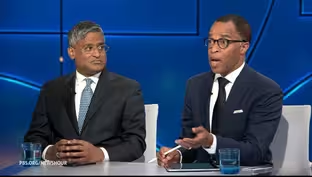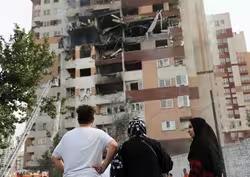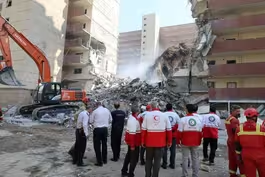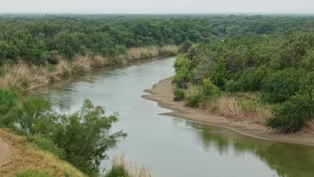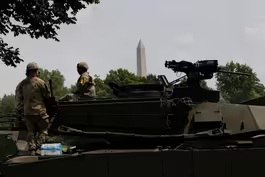
Leiter: Iran's nuclear program an 'existential' threat
Clip: 6/13/2025 | 7m 16sVideo has Closed Captions
'This is a threat to our existence,' Israeli ambassador says of Iran's nuclear program
Israel's brazen attack and Iran's unprecedented response have world leaders concerned that the fighting will only escalate. To discuss Israel's goals and what comes next, Amna Nawaz spoke with Israeli Ambassador to the U.S. Yechiel Leiter.
Problems playing video? | Closed Captioning Feedback
Problems playing video? | Closed Captioning Feedback
Major corporate funding for the PBS News Hour is provided by BDO, BNSF, Consumer Cellular, American Cruise Lines, and Raymond James. Funding for the PBS NewsHour Weekend is provided by...

Leiter: Iran's nuclear program an 'existential' threat
Clip: 6/13/2025 | 7m 16sVideo has Closed Captions
Israel's brazen attack and Iran's unprecedented response have world leaders concerned that the fighting will only escalate. To discuss Israel's goals and what comes next, Amna Nawaz spoke with Israeli Ambassador to the U.S. Yechiel Leiter.
Problems playing video? | Closed Captioning Feedback
How to Watch PBS News Hour
PBS News Hour is available to stream on pbs.org and the free PBS App, available on iPhone, Apple TV, Android TV, Android smartphones, Amazon Fire TV, Amazon Fire Tablet, Roku, Samsung Smart TV, and Vizio.
Providing Support for PBS.org
Learn Moreabout PBS online sponsorshipFor more on Israel's goals and what comes next, we're joined now by the Israeli ambassador to the U.S., Yechiel Leiter.
Ambassador Leiter, welcome back to the "News Hour."
Thank you for joining us.
YECHIEL LEITER, Israeli Ambassador to the United States: Thank you, Amna.
It's good to be with you.
AMNA NAWAZ: I want to begin by asking you about the latest we're seeing of the extraordinary Iranian missile attacks unfolding over Tel Aviv at this moment.
As we speak, what can you tell us about the latest on the ground?
What kind of damage has been inflicted so far in Israel?
YECHIEL LEITER: Well, we know, at present, there are 35 people injured right outside of Tel Aviv, two critically.
We're praying for their survival.
Iran has a very large array of ballistic missiles.
They have fired them in the past, both in April and in October.
At that time, we were able to intercept them.
Several have gotten through this time, a total of 85 in this barrage.
These are huge missiles.
And we do have -- we have sustained injuries.
AMNA NAWAZ: A U.S. official said today that the U.S. military is helping to intercept some of those Iranian missiles.
Are you expecting U.S. forces to participate more deeply than that when it comes to defending Israel?
Is that something that Prime Minister Netanyahu and President Trump spoke about today?
YECHIEL LEITER: The United States has had our back, both in April and October.
There are anti-aircraft missiles that have been set in the Middle East to help support our Iron Dome system.
This is a barrage of dozens of missiles all at the same time, and it needs a support system.
And we're very, very thankful for the defensive posture that the United States has taken now for a third time in helping to prevent these missiles from exacting dramatic damage on our civilian population.
It's important to emphasize, I mean, when we attacked yesterday in Tehran, we focus on the military commanders and the scientists developing nuclear weapons.
Iran has shot ballistic missiles into civilian population centers with the hope of injuring and killing scores of innocent people.
AMNA NAWAZ: Can I ask, is there any expectation, any conversation that's been had about the U.S. or U.S. forces participating more deeply than intercepting missiles, as they have so far?
YECHIEL LEITER: e have begun this operation with the intention of eliminating Iran's nuclear enrichment facilities.
We are intent on completing this.
We have not asked for American involvement, only for help with protecting our civilian population.
And we're committed to seeing this process through until the threat of nuclear annihilation by Iran is removed.
AMNA NAWAZ: And what can you tell us about the damage Israel has been able to inflict on Iran so far?
Has their nuclear program been destroyed?
Has it been severely degraded?
What's your assessment?
YECHIEL LEITER: It's been severely degraded, but we have a ways to go.
This is not something that can be done in a few hours.
The top brass of the IRGC -- that's the terrorist-sponsoring leadership -- next to the army has pretty much been eliminated.
Many of the top brass in the army that were responsible for the nuclear weaponization program have been eliminated.
The site of Natanz, where uranium is enriched to be turned into a nuclear weapon, has been severely damaged.
We're not quite sure that it's been eliminated yet, but that needs to be determined over the next few hours.
The conversion center for fuel in order to turn fuel into material that can be used for weaponization has been compromised in Isfahan.
We also have compromised the ground-to-air missile batteries that the Iranian regime uses to shoot into Israel.
We have compromised them dramatically, but not quite eliminated them.
So this is an operation that will take several days, and we're committed to seeing it through.
We have to erase this threat to our existence.
This is not a border dispute.
This is a threat to our existence.
They make no secret about it.
The Iranian regime has made a very concrete plan.
It's actually a printed plan, and which calls for the destruction of the state of Israel.
And that's not something we can live with.
For us, it's existential.
AMNA NAWAZ: We saw Prime Minister Netanyahu say that obviously part of the goal here is preventing Iran from becoming nuclear-armed.
But we also heard him speak directly to the Iranian people.
He said: "We're also clearing the path for you to achieve your freedom.
This is your opportunity to stand up and let your voices be heard."
Ambassador, is regime change in Iran part of the goal here?
YECHIEL LEITER: Well, it's not part of our goal.
If it facilitates the goal of the Iranian people, that's fine.
But regimes have to be determined by the people.
That's how the democratic process works.
So we don't focus on regime change.
We want militarization change.
We want the annihilationist ideology of the regime to change.
If the Iranian people rise up, as they have tried to do in the past, and change their regime, that's for them to decide, not for us to decide.
AMNA NAWAZ: As you know, there were ongoing talks between the U.S. and Iran to restrict their nuclear program when Israel struck Iran.
There was another round scheduled for this Sunday.
Do you want to see those talks move forward?
Do you have confidence that they could reach a deal?
YECHIEL LEITER: We'd like to see the talks move forward, but we're not confident that the Iranians will come around to a deal.
We were skeptical from the outset.
We encouraged the talks because it's important to try to pursue a path of negotiation, rather than a military one.
But the fact of the matter is that the Iranians are ideologically and theologically committed to destroying Israel.
And they have no intention whatsoever of drawing back their nuclear program, nuclear weaponization program.
Look, the fact of the matter is that the president of the United States gave the Iranians 60 days.
Yesterday was the 61st day.
It's over, number one.
Number two, the IAEA issued a scathing report.
This is not an Israeli report.
This is an International Atomic Agency report, which basically indicted the Iranian regime for violations and for the development of a nuclear weapons program.
And we see -- this is the most important point, Amna.
We see in our intel that they're racing forward to achieve the weaponization of enriched uranium.
That means a nuclear bomb.
That changes the world.
And, for us, it changes the entire equation because it endangers our very existence.
We can't live with that.
AMNA NAWAZ: That is the Israeli ambassador to the United States, Yechiel Leiter, joining us tonight.
Ambassador Leiter, thank you for your time.
We appreciate it.
YECHIEL LEITER: Thank you, Amna.
Good evening.
Capehart and Ponnuru on Israel's attack and Iran's response
Video has Closed Captions
Clip: 6/13/2025 | 11m 43s | Capehart and Ponnuru on the politics of Israel's attack and Iran's response (11m 43s)
Israel hit with missiles as Iran retaliates for strikes
Video has Closed Captions
Clip: 6/13/2025 | 4m 2s | Israel hit with missiles as Iran retaliates for strikes on nuclear sites and leaders (4m 2s)
Mideast experts discuss what's next for Israel-Iran conflict
Video has Closed Captions
Clip: 6/13/2025 | 8m 27s | Mideast experts discuss what's next for the region as Israel-Iran conflict erupts (8m 27s)
U.S. accuses Mexico of stealing water from Texas farmers
Video has Closed Captions
Clip: 6/13/2025 | 9m 1s | U.S. accuses Mexico of stealing water from Texas farmers as climate strains resources (9m 1s)
What to expect as Washington hosts Trump's military parade
Video has Closed Captions
Clip: 6/13/2025 | 3m 43s | What to expect as Washington hosts Trump's military parade (3m 43s)
Providing Support for PBS.org
Learn Moreabout PBS online sponsorship
- News and Public Affairs

FRONTLINE is investigative journalism that questions, explains and changes our world.

- News and Public Affairs

Amanpour and Company features conversations with leaders and decision makers.












Support for PBS provided by:
Major corporate funding for the PBS News Hour is provided by BDO, BNSF, Consumer Cellular, American Cruise Lines, and Raymond James. Funding for the PBS NewsHour Weekend is provided by...
